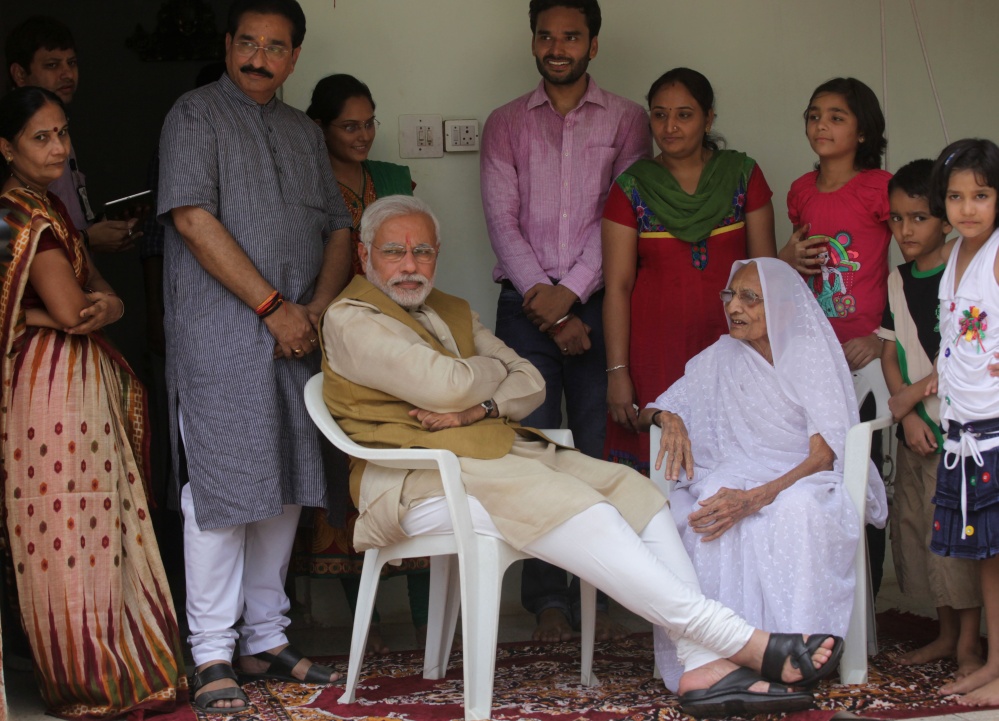NEW DELHI — India’s opposition leader, Narendra Modi, will become the next prime minister of the world’s largest democracy, winning the most decisive election victory the country has seen in three decades and sweeping the long-dominant Congress party from power.
Modi, a career politician whose campaign promised a revival of economic growth, will have a strong mandate to govern at a time of profound changes in Indian society. He also has said he wants to strengthen India’s strategic partnership with the United States. But critics worry the ascendance of his Hindu nationalist party could worsen sectarian tensions with India’s minority 138 million Muslims.
The results were a crushing defeat for the Congress party, which is deeply entwined with the Nehru-Gandhi political dynasty that has been at the center of Indian politics for most of the country’s post-independence history. The party, led by outgoing Prime Minister Manmohan Singh, has been plagued by repeated corruption scandals and a poor economy.
As his overwhelming win became clear Friday, Modi appeared before a crowd of cheering supporters and tried to strike a conciliatory note.
“I have always said that to govern the nation it is our responsibility to take everyone with us,” Modi said after a lengthy and punishing race. “I want your blessings so that we can run a government that carries everyone with it.”
Nevertheless, Modi remains a divisive figure in the country of 1.2 billion people, in large part because he, as chief minister of Gujarat state, was in command in 2002 when communal rioting there killed more than 1,000 people – most of them Muslims.
Modi was accused of doing little to stop the rampage, though he denies any wrongdoing and has never been charged with a crime. He was denied a U.S. visa in 2005 for alleged complicity in the riots, although as prime minister he would be virtually assured a visa.
On Friday, President Obama called Modi to congratulate him on his victory and invited him “to visit Washington at a mutually agreeable time to further strengthen our bilateral relationship,” the White House said. The U.S. administration had watched Modi’s rise carefully, and in February, for the first time in Modi’s decade-long tenure as the top official in Gujarat state, the American ambassador met with him.
In India, the question now is whether Modi can be a truly secular leader in a country with many faiths. The Congress party tried to highlight the 2002 riots during the campaign, but Modi’s momentum – and laser focus on the ailing economy – carried him to victory.
By Friday night, Modi’s Hindu nationalist Bharatiya Janata Party was winning enough seats in the lower house of Parliament to exceed the 272-seat majority needed to create a government without forming a coalition with smaller parties, the Election Commission said. Of the 483 seats declared, the BJP had won 271 and was leading in another 11.
The Congress party had won 42 seats and was leading in another two. Full results were expected Saturday, but Modi’s win was all but assured.
There was a record turnout in the election, with 66.38 percent of India’s 814 million eligible voters casting ballots during the six-week contest, which began April 7 and was held in stages across the country. Turnout in the 2009 general election was 58.13 percent.
The last time any single party won a majority in India was in 1984, when an emotional nation gave the Congress party a staggering victory of more than 400 seats following the assassination of then-Prime Minister Indira Gandhi.
But 30 years later, India is now in the throes of rapid urbanization and globalization just as the youth population is skyrocketing. Many new voters are far less deferential to traditional voting patterns focused on family lineage and caste. For the young Indian voters, the priorities are jobs and development, which Modi put at the forefront of his campaign.
The BJP has promised to change tough labor laws that make foreign manufacturers reluctant to set up factories in India. Manufacturing makes up only 15 percent of India’s economy, compared to 31 percent in China.
Send questions/comments to the editors.



Success. Please wait for the page to reload. If the page does not reload within 5 seconds, please refresh the page.
Enter your email and password to access comments.
Hi, to comment on stories you must . This profile is in addition to your subscription and website login.
Already have a commenting profile? .
Invalid username/password.
Please check your email to confirm and complete your registration.
Only subscribers are eligible to post comments. Please subscribe or login first for digital access. Here’s why.
Use the form below to reset your password. When you've submitted your account email, we will send an email with a reset code.